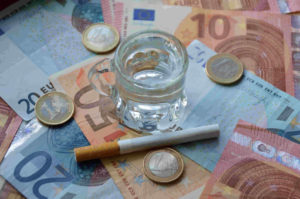Budget ’22 – hospitality reacts

While excise duty on alcohol was not increased in the Budget, the VFI has described the government’s decision not to reduce the tax, the second-highest in Europe, as a missed opportunity.
As part of the winding-down of the EWSS, two rates are to be introduced next year and it will be closed to new entrants.
Some €60 million is also to be allocated towards extending the commercial rates waiver until the end of 2021.
This is also an important development, providing time to recoup losses sustained through almost 18 months of closure due to the pandemic.
The minimum wage is also to increase by 30 Cent to €10.50 per hour as recommended by the Low Pay Commission.
However, the VFI described the Government’s decision not to extend the 9% hospitality VAT rate past August 2022 as disappointing given the challenges the hospitality trade will face over the coming year. The fact that most European countries utilise the 9% rate places Ireland at a disadvantage when seeking to attract inbound trade.
While excise duty was not increased in the Budget, the VFI has described the government’s decision not to reduce the tax, the second-highest in Europe, as a missed opportunity.
“Budget 2022 recognises that significant challenges remain for the pub sector,” said VFI Chief Executive Padraig Cribben, speaking after Budget 2022 was unveiled, “By maintaining the EWSS until next April and keeping the commercial rates waiver in place until the end of year the Government is giving publicans a chance to trade out of the most difficult 18 months imaginable.
“Our members remain hugely concerned about consumer confidence and the impact of the forced closure of venues since March 2020. With these Budget measures Government is effectively giving our members more time to rebuild their businesses.
“The decision to increase the 9% hospitality VAT to 13.5% next September is short-sighted given that tourism will be significantly impacted for years to come. The crisis in hospitality is such that the lower VAT rate needs to be in place until at least 2025.
“Overall, the extensions to EWSS and the commercial rates waiver are meaningful supports for the trade as it begins to navigate the post-Covid world,” he concluded.
Dublin counterpart the Licensed Vintners Association has said that Budget 2022 was generally positive for the hospitality sector but warned the VAT increase coming next September will be a serious problem.
The LVA also warmly welcomed the decision that Government charges imposed on late night venues such as late bars and nightclubs will be waived until the end of 2021. This is an issue the LVA raised extensively with the Government in the run-up to the Budget.
Late bars and nightclubs are expected to reopen on the 22nd of October following 585 consecutive days of closure. Had these charges not been waived the LVA estimates that over 300 late bars and nightclubs around the country would have been forced to make advance payments of €2.2 million to Government before they could reopen. The LVA has argued that this would have been an unfair imposition on businesses which had zero business in more than 18 months.
The LVA too believes that while most of the measures struck a positive tone for the sector, the Government’s decision to increase the hospitality VAT rate next Autumn will be a problem.
Currently the hospitality VAT rate is 9% but the Government confirmed a 50% increase in the rate to 13.5% from September 2022. This will have a significant inflationary impact on costs across the hospitality sector and the LVA anticipates that further engagement with the Government on this issue will be necessary.
“Overall this has been a generally positive Budget for the hospitality sector,” confirmed LVA Chief Executive Donall O’Keeffe, “The extension of the rates waiver and the retention of the wage subsidy supports will provide some stability to businesses who’ve effectively been shuttered for most of the last 18 months and who’re still operating with severe constraints in place. It’s going to take months for our industry to recover and these measures are essential to allow pubs and other hospitality businesses to get back on their feet.
“Looking ahead, we’re concerned about the implications of the decision to increase the VAT rate from next September. That’s going to have a significant inflationary impact on hospitality costs from next Autumn onwards, with the level of VAT charged effectively due to rise by 50%. We think that will be problematic for the sector and we will be seeking to further engage with the Government on this matter,” he concluded.
However the Restaurants Association of Ireland described the Budget as “disastrous” for hospitality & tourism. Describing yesterday’s Budget as one with no ambition to stimulate and revitalise the tourism industry with the 9% VAT rate set to end in August 2022, RAI Chief Executive Adrian Cummins has warned that the hospitality industry faces a challenging five years to restore levels of business to that of pre-Covid.
“Whilst wage supports remain in place for the still restricted restaurant, hospitality and tourism sector, they’ll taper off in the new year,” he pointed out. “This budget is a disaster for our members, restaurants, cafes and gastropubs, a vital element of our Tourism offering,” he stated, “The VAT rate ending and wage supports tapering off will be the death nail in the coffin [sic] of many hospitality businesses this Winter.
“Although the supports offered in today’s budget are welcomed, there are still some long hard months ahead,” he continued, “Since Lockdown measures and restrictions have been put in place, our industry has complied with the rules. Public safety and the safety of workers have always been at the top of our agenda. But this has meant serious financial difficulties for many. We needed the Government to help us fight for survival; today’s announcements fall short of that and we will need ongoing support to trade out of this.”
Cider
Elsewhere Drinks Ireland|Cider has welcomed the news that the Finance Minister has announced the introduction of an excise relief programme of up to 50% for independent small producers of cider and other fermented beverages. The Minister stated in his Budget speech that his officials will work with the cider sector to allow for the implementation of this relief in next year’s Finance Bill.
Seamus O’Hara, the Drinks Ireland|Cider Chair is also the Founder and Chief Executive of Carlow Brewing Company. He stated, “There are at least a dozen craft cider producers scattered across Ireland that will benefit greatly with this reduction, enabling further investment, job creation and innovation. The move will benefit the wider cider sector by allowing expansion of and greater consumer interest in the category. It will also result in downstream benefits to the wider economy, particularly in retail, hospitality and tourism.
“This decision is timely in the context of the challenges facing the cider sector. Ireland already has the third-highest rate of excise on cider in the EU/UK. The sector has also been hard hit by the pandemic, with cider’s market share of beverages falling from 7.4% in 2019 to 6.9% in 2020.”
This announcement followed a substantial lobbying campaign by Drinks Ireland|Cider pointed out Jonathan McDade, Head of Cider at Drinks Ireland.
But Daniel Emmerson, Chairperson of Cider Ireland and Chief Executive of Nohoval Drinks Company, producers of Stonewell Cider, pointed out, “While Cider Ireland welcome the Government’s commitment to reducing excise duty for small producers of craft cider by 50% next year, it’s very regrettable that we must wait another year before being afforded the same treatment as craft beer. The year is a further, unjustifiable delay on the new jobs, tourism, exports and carbon-busting new orchards that will emerge all around rural Ireland once the 50% reduction in duty is implemented.
“We – and the communities we are part of – deserve a level playing field.”









